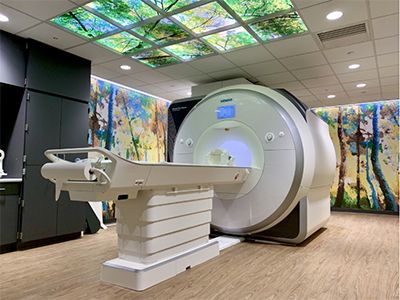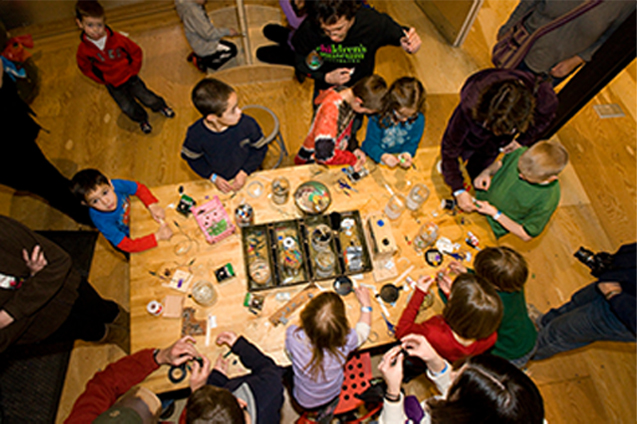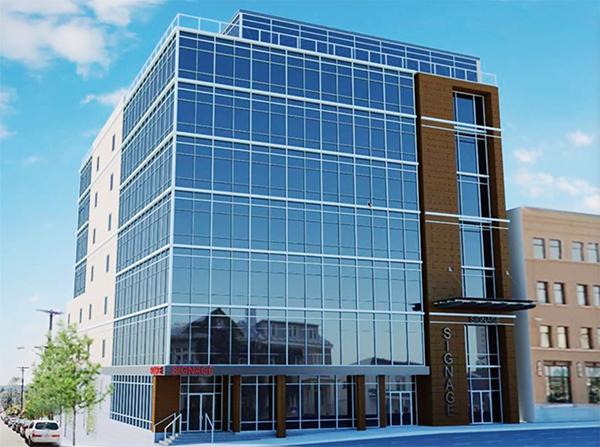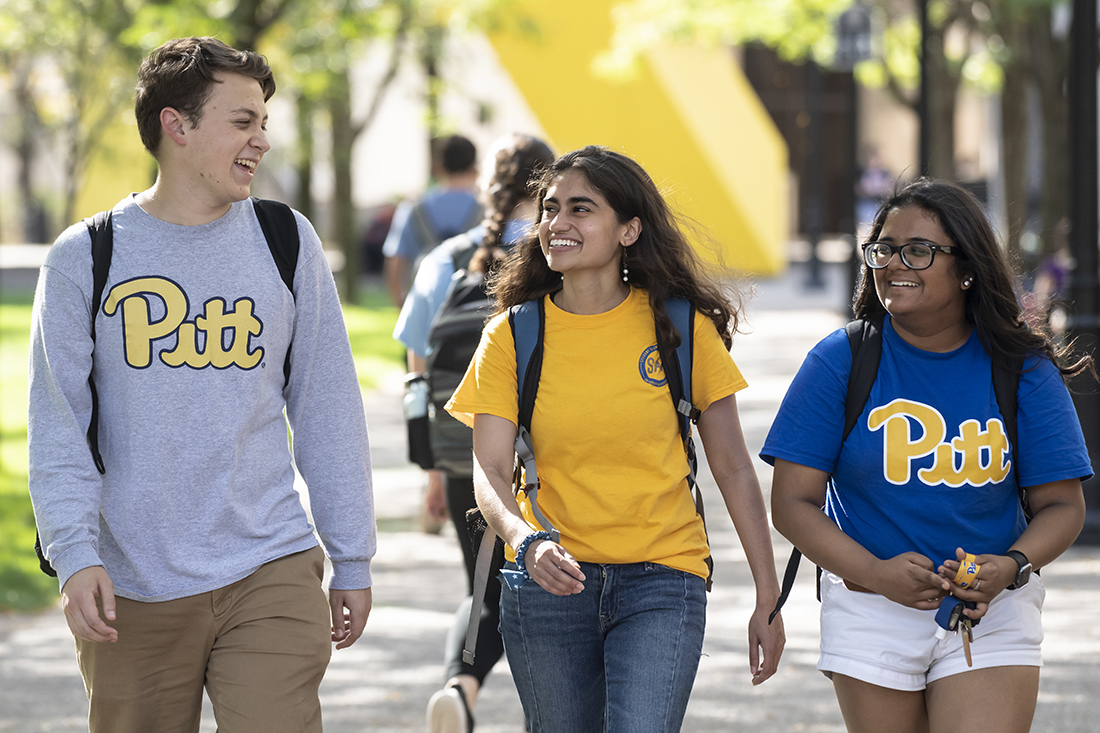Connections
The Brain Institute: The Brain Institute provides a unifying structure and collaborative framework for the many diverse research units that make up the neuroscience community at Pitt. This reflects the central importance of understanding the brain, how it develops, how it functions normally, and how to protect it from damage and cure it from abnormal function. See LRDC faculty affiliated with The Brain Institute.
 Bridge Center: The CMU-Pitt Brain Imaging Data Generation & Education (BRIDGE) Center is a cutting-edge, collaborative MRI facility that is jointly operated by the University of Pittsburgh and Carnegie Mellon University (CMU) designed exclusively to support basic science research and the next generation of brain scientists. Learn more about the Bridge Center.
Bridge Center: The CMU-Pitt Brain Imaging Data Generation & Education (BRIDGE) Center is a cutting-edge, collaborative MRI facility that is jointly operated by the University of Pittsburgh and Carnegie Mellon University (CMU) designed exclusively to support basic science research and the next generation of brain scientists. Learn more about the Bridge Center.
Discipline-Based Education Research Center (dB-SERC): LRDC researchers work with faculty members in all Natural Sciences departments to create a community to improve teaching and learning through evidence-based practices for more effective teaching and learning strategies. Learn more about Discipline-Based Education Research Center (dB-SERC).
University Center for Teaching and Learning (UCTL): LRDC senior scientists, postdoctoral researchers, and Teaching Center staff collaborate on projects focusing on educational technology, online learning, active learning, and high enrollment classes. Learn more about University Center for Teaching and Learning (UCTL).
Contributions: University of Pittsburgh Community
Adaptive Mindsets Toolkit: LRDC researchers have developed and delivered a carefully designed curriculum for undergraduate students. The researchers have created a program that gives students key non-cognitive skills (drawn from research) to help them succeed. This content is being hosted on a web portal included in the Student Success Services webpage. This training is now in its third year of implementation, with an increasing number of participants each year. Learn more about Student Success Services.
Course Incubator: LRDC has partnered with the Teacher Center to conduct research and quality improvement studies on innovative teaching practices in higher education. A particular area of focus has been the Course Incubator, launched in 2018 with projects in three departments - Biology, Chemistry, and Economics. The goal of the projects is to increase student engagement by incorporating active learning strategies and improve learning gains.
 Pitt Transition Study: LRDC researchers teamed up with researchers at Stanford University to study the social and motivational factors that influence college success. The project, now in its 3rd year, included more than 2000 Pitt freshmen as part of a cross-national experiment taking place at 26 other campuses. The study aims to teach students, particularly those who face adversity, how to foster perseverance and engagement during their ransition to college.
Pitt Transition Study: LRDC researchers teamed up with researchers at Stanford University to study the social and motivational factors that influence college success. The project, now in its 3rd year, included more than 2000 Pitt freshmen as part of a cross-national experiment taking place at 26 other campuses. The study aims to teach students, particularly those who face adversity, how to foster perseverance and engagement during their ransition to college.
Pitt Program Impact Initiative: New work is the Program Impact Initiative, aimed at supporting under-represented groups transition to college. An LRDC researcher is now serving on the evaluation committee for first-year support services. A goal of the initiative is to review and improve the content, quality, frequency, and availability of services students have access to once they start at Pitt.
Contributions: Pittsburgh Community
Carnegie Museum of Natural History (CMNH): Museums are important institutions for informal learning. In partnership with CMNH, UPCLOSE has created dynamic interactive exploratory projects where children can engage in discovery learning about places and nature.
Community Engagement Centers (CEC): LRDC faculty participate in the University of Pittsburgh's recent CEC initiative to identify ways faculty research and teaching can benefit the surrounding economically depressed communities of the city.
Neighborhood Resilience Project (NRP): LRDC faculty contribute to the NRP in Pittsburgh's Hill District, working hand in hand with community members and community groups to implement what is called Trauma-Informed Community Development. This framework focuses on Health and Wellbeing, Opportunity Making, Placemaking, and Engaging Influencers ("HOPE Plans").
 Pittsburgh Children's Museum: Named one of the nation's top 15 children's museums by Parents magazine in 2015, the Museum welcomes over 306,000 visitors annually and provides lots of different experiences for play and learning. Hands-on, interactive exhibit areas inspire joy, creativity and curiosity which include The Studio, MAKESHOP, Waterplay, Nursery, Theater and Backyard.
Pittsburgh Children's Museum: Named one of the nation's top 15 children's museums by Parents magazine in 2015, the Museum welcomes over 306,000 visitors annually and provides lots of different experiences for play and learning. Hands-on, interactive exhibit areas inspire joy, creativity and curiosity which include The Studio, MAKESHOP, Waterplay, Nursery, Theater and Backyard.
Contributions: Broader Societal Impact
 Climate Change: Researchers at the UPCLOSE investigate how informal learning experiences that go beyond the classroom can prepare citizens for 21st Century challenges. UPCLOSE is currently conducting climate change education sessions in a number of settings around the state of Pennsylvania.
Climate Change: Researchers at the UPCLOSE investigate how informal learning experiences that go beyond the classroom can prepare citizens for 21st Century challenges. UPCLOSE is currently conducting climate change education sessions in a number of settings around the state of Pennsylvania.
Economics of Higher Education: Faculty and graduate students have researched the Free Application for Federal Student Aid (FAFSA) completion rates, FAFSA completion rates for minority students, and FAFSA.
Emergency Medical Technician (EMT) Training: LRDC researchers are developing a handheld tablet that will allow paramedic students to get extra practice in performing clinical care procedures.
Law: Faculty use natural language processing (NLP) and machine learning (ML) techniques to evaluate hypotheses about systemic aspects of court decisions on social issues involving racism, gender equality, immigration, public health, crime, and education.
Medicine: LRDC faculty are working with the American Board of Internal medicine, American Board of Family Medicine, and American Boards of Medical Specialties on their new assessments of physicians.
Contact Us

Top of page
 Bridge Center: The CMU-Pitt Brain Imaging Data Generation & Education (BRIDGE) Center is a cutting-edge, collaborative MRI facility that is jointly operated by the University of Pittsburgh and Carnegie Mellon University (CMU) designed exclusively to support basic science research and the next generation of brain scientists. Learn more about the Bridge Center.
Bridge Center: The CMU-Pitt Brain Imaging Data Generation & Education (BRIDGE) Center is a cutting-edge, collaborative MRI facility that is jointly operated by the University of Pittsburgh and Carnegie Mellon University (CMU) designed exclusively to support basic science research and the next generation of brain scientists. Learn more about the Bridge Center.


 Pitt Transition Study: LRDC researchers teamed up with researchers at Stanford University to study the social and motivational factors that influence college success. The project, now in its 3rd year, included more than 2000 Pitt freshmen as part of a cross-national experiment taking place at 26 other campuses. The study aims to teach students, particularly those who face adversity, how to foster perseverance and engagement during their ransition to college.
Pitt Transition Study: LRDC researchers teamed up with researchers at Stanford University to study the social and motivational factors that influence college success. The project, now in its 3rd year, included more than 2000 Pitt freshmen as part of a cross-national experiment taking place at 26 other campuses. The study aims to teach students, particularly those who face adversity, how to foster perseverance and engagement during their ransition to college.  Pittsburgh Children's Museum: Named one of the nation's top 15 children's museums by Parents magazine in 2015, the Museum welcomes over 306,000 visitors annually and provides lots of different experiences for play and learning. Hands-on, interactive exhibit areas inspire joy, creativity and curiosity which include The Studio, MAKESHOP, Waterplay, Nursery, Theater and Backyard.
Pittsburgh Children's Museum: Named one of the nation's top 15 children's museums by Parents magazine in 2015, the Museum welcomes over 306,000 visitors annually and provides lots of different experiences for play and learning. Hands-on, interactive exhibit areas inspire joy, creativity and curiosity which include The Studio, MAKESHOP, Waterplay, Nursery, Theater and Backyard. Climate Change: Researchers at the
Climate Change: Researchers at the 